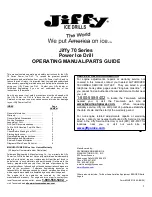
8
INSTALLATION
Locating Grill/Built-in Clearances
IMPORTANT!
Before installation, remove shipping brackets from the grill.
Loosen the four screws. Slide the shipping bracket off and
re-tighten the screws.
Location
When determining a suitable location, take into account concerns such as exposure to wind,
proximity to traffic paths and keeping any gas or electrical supply lines as short as possible and
away from heat sources. Locate the grill only in a well ventilated area. Do not build the grill under
overhead unprotected combustible construction. Never locate the grill in a building, garage,
breezeway, shed or other such enclosed areas. During heavy use, the grill will produce a lot of heat
and smoke. Ensure that the grill is used in a well ventilated area.
If locating the grill in a windy area, try to locate the grill so the prevailing wind will blow air at the
front of the grill as shown in Fig. 01b. This will assist the grill in venting hot air through the back of
the grill. In addition, this will help keep any smoke from blowing at someone who is cooking on the
grill. If you have to locate the grill in a windy area where the prevailing wind is at the rear of the
grill (Fig. 01a), a windscreen must be installed. The windscreen
should be set-up so that it blocks
wind from entering the exhaust vent in the rear of the unit as shown in Fig. 01c. Location of the
windscreen relative to rear of the grill must adhere to the clearances specified for combustible or
non-combustible construction as defined in these instructions. Refer to following pages.
As a high-performance gas appliance, your grill requires significant amounts of air to support the
combustion process. Your grill is designed to take air in through the valve panel area, and send the
exhaust products out through the exhaust gap at the rear of the hood. Using your grill in windy
conditions can disrupt the proper flow of air though your grill, leading to reduced performance, or in
certain severe cases, causing heat buildup in the valve panel area. This can lead to problems such as
having the knobs melt, or burn hazards when the valve panel surfaces become too hot to touch.
Please note that damage to your grill resulting from use in windy conditions, such as melted knobs or
igniter wires, or valve panel discoloration from heat build-up, are excluded from warranty coverage.
Summary of Contents for BH1-36R Series
Page 8: ...6 BH1 48R BH1 48RGI BH1 48RS BH1 36R BH1 36RGI GRILL MODELS ...
Page 41: ......
Page 48: ...6 BH1 48R BH1 48RGI BH1 48RS BH1 36R BH1 36RGI MODÈLES DE GRIL ...
Page 81: ......











































